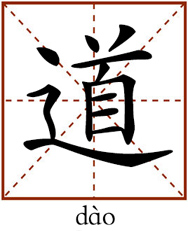Road

This character is generally known as road, route or path. It also signifies doctrine or principle. In the context of traditional Chinese philosophy, it refers to Tao, the natural order of the universe.
东道主
dōng dào zhǔ
Dong means east and dao means the road or the way. Zhu refers to host. The phrase literally means the host on the eastern road.
This phrase originates from an ancient Chinese narrative history named Zuo Zhuan, or The Commentary of Zuo by Zuo Qiuming. In 630 BCE, the states of Qin and Jin besieged the state of Zheng. Zhu Zhiwu, a minister of the Zheng, went to lobby the ruler of Qin to save his homeland. He argued that destroying the state of Zheng did no good to Qin as the two states were not neighboring states. On the contrary, if Qin spared Zheng, Zheng could be a servant on the eastern road to host the Qin army whenever they passed by. As a result, the ruler of Qin was persuaded and withdrew his army.
This phrase now refers to a host. For example, as the host country of the 2008 Olympic Games, China could be called dongdaozhu.
假道灭虢
jiǎ dào miè guó
Jia means to borrow while dao means a road. Mie means to destroy or conquer while guo refers to a small state in the Spring and Autumn Period.
This proverb is a military tactic that originates from a historical event also recorded in the Zuo Zhuan. The ruler of the state of Jin intended to conquer two small states—Yu and Guo. Jin was adjacent to Guo, while Guo was adjacent to Yu. The ruler of Jin first asked permission of the state of Yu to pass through its territory to conquer the state of Guo. One minister of Yu objected to Jin’s proposal and said that the relationship between Yu and Guo was like the relationship between one’s lips and teeth. Once the lips were lost, the teeth would certainly feel chilly. However, the ruler of Yu was bribed with a large amount of treasures, and he gave permission. After conquering Guo, Jin attacked Yu and destroyed it on their way back while passing through its capital city in 655 BCE.
edited by REN GUANHONG
